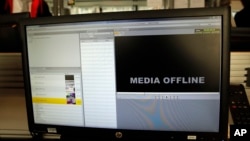Italy's Hacking Team, which makes surveillance software used by governments to police the web, appeared to be the victim of hacking on a grand scale itself on Monday.
The Milan-based company, which describes itself as a maker of lawful interception software used by police and intelligence services worldwide, has been accused by anti-surveillance campaigners of selling snooping tools to governments with poor human rights records.
Hacking Team found its Twitter account hijacked on Monday and used by hackers to release what is alleged to be more than 400 gigabytes of the company's internal documents, email correspondence, employee passwords and the underlying source code of its products.
"Since we have nothing to hide, we're publishing all our emails, files and source code," posts published on the company's hijacked Twitter account said, but were subsequently deleted.
One U.S. privacy rights activist hailed the publication of the stolen Hacking Team documents as the "best transparency report ever", while another digital activist compared the disclosures to a Christmas gift in July for anti-surveillance campaigners.
Among the documents unearthed and published by unknown hackers was a spreadsheet that purports to show the company's active and inactive clients at the end of 2014.
Those listed included police agencies in several European countries, the FBI and Drug Enforcement Administration (DEA) in the United States, as well as police and state security organizations in countries with records of human rights abuses, including Egypt, Ethiopia, Kazakhstan, Morocco, Nigeria, Saudi Arabia and Sudan.
Sudan's National Intelligence Security Service was one of two customers in the client list given the special designation of "not officially supported." However, a second document, an invoice for 480,000 euros to the same security service, calls into question repeated denials by the Hacking Team that it has ever done business with Sudan.
Hacking Team did not respond to emails or calls seeking to confirm the veracity of the documents. In a previous statement in March, the company said it could not disclose its clients "since to do so could jeopardize ongoing law enforcement Investigations."
The 12-year-old, Milan-based company was singled out in 2012 as one of five private sector "Corporate Enemies of the Internet" in a 2012 report by Reporters Without Borders.
Citizen Lab, a digital rights research group loosely affiliated with the University of Toronto, has published numerous reports linking Hacking Team software to repression of minority and dissident groups, as well as journalists in a number of countries in Africa and the Middle East.





